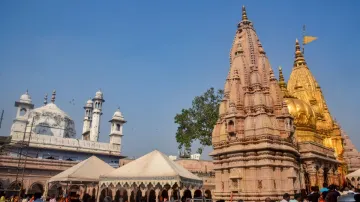US: Hindu American group welcomes Varanasi court's decision allowing puja in Gyanvapi complex
The Vishwa Hindu Parishad of America termed Varanasi district court's decision to allow prayers in Gyanvapi complex as "historic". It said the Archeological Survey of India (ASI) report revealed undeniable evidence of the demolition of a Hindu temple.

Washington: A prominent Hindu-American group has welcomed the Varanasi court's decision to allow Hindu prayers in the Gyanvapi mosque basement, saying it restores the rights of those which were unlawfully taken from Hindus in November 1993. The Vishwa Hindu Parishad of America (VHPA) described "historic" the ruling of a Varanasi district court to allow a priest to perform prayers before idols in the southern cellar of the mosque.
"The VHPA expresses deep appreciation for the thoughtful and just decision of the honourable court. This landmark ruling restores the rights that were unlawfully taken from Hindus in November 1993," said the group in a media release, joined by over a dozen Hindu American groups.
Rituals of puja in a cellar of the Gyanvapi Masjid began on Thursday after the court on Wednesday granted permission in the 'Vyas Ka Tekhana', a process said to be discontinued for over 30 years. This was a significant development in the legal battle over the mosque adjacent to the Kashi Vishwanath temple.
The rituals were allowed after an Archeological Survey of India (ASI) report, ordered by the same Varanasi court, suggested that the mosque was constructed during Aurangzeb's rule over the remains of a Hindu temple. The order was delivered on Wednesday on the plea of Shailendra Kumar Pathak who claimed that his maternal grandfather, priest Somnath Vyas, offered prayers till December 1993.
ASI provided undeniable evidence, says VHPA
The Varanasi District Judge had directed the district administration to make appropriate arrangements within 7 days for Hindus to conduct worship rituals inside one of the sealed cellars (Vyas ji ka tehkhana) inside the existing Gyanvapi mosque complex.
Pathak said the puja was stopped during the tenure of Chief Minister Mulayam Singh Yadav after the Babri Mosque in Ayodhya was demolished on December 6, 1992. The VHPA said the extensive archaeological surveys conducted by the ASI have previously unearthed undeniable evidence, indicating that the Gyanvapi mosque was constructed following the demolition of a Hindu temple.
"The VHPA underscores that this case is fundamentally about property rights and not a conflict against any minority group. The decision, grounded in irrefutable evidence presented by the Hindu side, aligns perfectly with the principles of justice... The VHPA applauds the court for recognizing the significance of this evidence," it said.
Hours after the Varanasi court delivered its verdict, the mosque committee approached the Supreme Court and the Allahabad High Court seeking a stay on that order. However, the apex court asked the committee to move the Allahabad High Court, which it did later in the day.
What is happening in the Gyanvapi case?
The Anjuman Intezamia Masjid Committee, which manages Gyanvapi mosque in Varanasi didn't get any relief from the Allahabad High Court on Friday as it filed a plea challenging a Varanasi court's order allowing Hindus to perform prayers in the southern cellar of the mosque. This means that Puja in the southern cellar of the complex will continue for now. The High Court has fixed February 6 as the next date for hearing in the matter.
The Muslim side filed a plea in district court seeking a stay for 15 days on puja inside the basement. The Hindu side also filed a caveat, seeking that it should be heard before the court passes any order. The All India Muslim Personal Law Board (AIMPLB) on Friday (February 2) expressed “shock” over the court’s ruling and alleged that the Muslim side was not given a chance to present its side on the matter.
The AIMPLB said that they would move the Supreme Court against the order of the court and also seek an appointment from President Droupadi Murmu. “Gyanvapi case has given a big shock to 20 crore Muslims as well as secular people. Today, secular Hindus and Sikhs are all sad and shocked. It is said that Muslims demolished the temples and built mosques over them, which is absolutely false. Islam does not allow this,” said AIMPLB chief Saifullah Rahmani.
(with inputs from PTI)